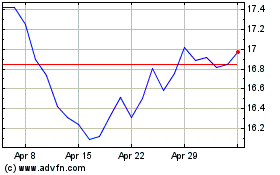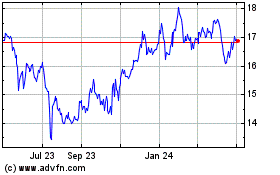Google's Marian Croak Aimed for the Top. She Couldn't Escape Racism.
June 26 2020 - 5:56PM
Dow Jones News
By Rob Copeland
Two years ago, Marian Croak was hiding in her office at Google's
YouTube offices, convinced the police would enter and shoot her
dead.
There was an active shooter on the San Bruno, Calif. campus, and
police were moving door-to-door to clear out staff. Though the
soft-spoken, petite Ms. Croak was clad in her Google lanyard, she
was unwilling to raise her arms and open the door as instructed,
lest the officer perceive her as a threat.
"I didn't understand how anyone could feel safe doing that. My
whole body felt like it was on fire," Ms. Croak says. "That's when
I became aware that I was a black person in that situation. All
kinds of fear and dissonance went through my head."
The graduate of New York City public schools (she later went to
Princeton University and the University of Southern California) has
long been an outsider in corporate America. At AT&T Inc., where
she worked for more than three decades, she initially met internal
resistance advocating for routing phone calls over the internet
rather than over the usual telephone networks. That technology now
is widely used to make free voice and videoconferencing calls
between computers, and has resulted in hundreds of new patents.
At Google Ms. Croak is vice president for site reliability
engineering, overseeing hundreds of staffers who troubleshoot
complicated software problems across the conglomerate. That makes
her one of the highest ranking black female executives among
Google's roughly 200,000 full-time and contract workers.
She spoke to The Wall Street Journal about her career as an
outlier, and the catharsis of the past few weeks. Edited excerpts
follow:
WSJ: How did that day at YouTube affect you?
Ms. Croak: I remember seeing officers with AK-47's in their
hands every time they walked past my office. I had all my
identification but I was terrified to come out because I was afraid
I would startle them. [Google security] said they would accompany
the officers to my office. I remember telling the officers when I
was walking out that I was afraid they were going to shoot me, and
they just sort of looked away. I told my children and then I just
stopped thinking about it.
WSJ: How else has your race been a factor in your career?
Ms. Croak: Years ago, when I was working at AT&T in New
Jersey, I was hit by a car in the morning on my way to work. I was
on my way to an important business meeting and this was a time when
women would wear dresses and be in curls. I woke up, surrounded by
first responders, and the first person I saw was a police officer
asking if there was a warrant for my arrest. He said, "Have you
fled bail?" and ordered me out of the car. This guy was relentless.
I was driving a Toyota. It was a car where you wouldn't think I was
a criminal and I didn't feel I looked like a criminal. I don't
remember being put into an ambulance.
WSJ: Did you tell anyone about it?
Ms. Croak: I didn't even tell my parents, and I never shared
that story with my children. My parents, who are deceased now,
would have been heartbroken. They always believed that they had
been through difficult times but that somehow my being a doctorate
or having a great job would protect me from what they had
experienced.
WSJ: What makes you bring it up now?
Ms. Croak: I recently shared that story with [Google CEO] Sundar
Pichai. All of these incidents are coming back into focus for me,
things that I try not to focus on and just don't want to give voice
to. It's too distracting. But we are all distracted now. It's so
therapeutic and cathartic to finally talk about it. People want to
listen. It's validating.
WSJ: Just 2.6% of Google's leadership is black. The company last
week said it would try to increase the ranks of underrepresented
groups in leadership by 2025. How?
Ms. Croak: We want people to realize that we care and they are
going to be welcomed. Some people have misinterpreted the companies
that are setting aspirational targets -- it's not like we are going
to lower the hiring bar. So many people are choosing to not even
apply. We are hoping that we can change that.
WSJ: In January, you became chair of Google's Black Leadership
Advisory Group. How has this year gone?
Ms. Croak: If you asked anyone, "Would Marian wind up ever being
a leader of the black community?" they'd say, "She's so quiet,
she's so introverted." I do care more about doing well at work, and
yet many of the things I hear people say they've experienced, I've
experienced as well. I feel immensely comfortable having white
colleagues and friends and relatives, but sometimes there's just
this slight unawareness that we live in parallel universes.
-- For more WSJ Technology analysis, reviews, advice and
headlines, sign up for our weekly newsletter .
Write to Rob Copeland at rob.copeland@wsj.com
(END) Dow Jones Newswires
June 26, 2020 17:41 ET (21:41 GMT)
Copyright (c) 2020 Dow Jones & Company, Inc.
AT&T (NYSE:T)
Historical Stock Chart
From Mar 2024 to Apr 2024

AT&T (NYSE:T)
Historical Stock Chart
From Apr 2023 to Apr 2024
